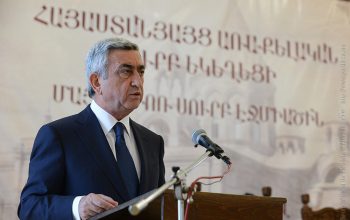Air Arabia, the Middle East’s largest low-cost airline, is reportedly planning to sue the Armenian government following the collapse of their joint venture established in 2021.
The Fly Arna venture was declared the “national carrier” by the government before it launched its inaugural flights to a limited number of foreign destinations in 2022. The airline ceased operations in January of this year and was stripped of its operating license two months later. It has since been undergoing liquidation.
Multiple foreign and Armenian news outlets reported late last week that Air Arabia, based in Sharjah, United Arab Emirates (UAE), is preparing an arbitration case against the Armenian government. Details of the legal action or the reasons behind it have not been disclosed. The amount of damages sought by the Emirati carrier is also unknown at this time.
Fly Arna was equally co-owned by Air Arabia and the Armenian National Interests Fund (ANIF), with each party investing 4.4 billion drams ($11 million) in its operations. Earlier this year, Prime Minister Nikol Pashinyan stated that the joint venture failed due to its inability to compete with other carriers.
Pashinyan’s government also decided to liquidate ANIF formerly chaired by Tigran Avinyan, an agency set up in 2019 to attract foreign investment to Armenia. ANIF’s most notable achievement was a 2021 deal with the UAE’s Abu Dhabi Future Energy Company, also known as Masdar, which pledged to build Armenia’s first large-scale solar power plant. However, the $174 million project appears to be on hold.
Although Pashinyan claims to have eliminated “systemic” corruption and created a level playing field for all businesses, no large-scale Western investment projects have been launched in Armenia during his tenure.
In 2018, Pashinyan’s newly installed government effectively disrupted a multimillion-dollar gold mining project launched by British-American company Lydian International, which was strongly opposed by local environmentalists. The company filed for bankruptcy protection in Canada in late 2019 before being restructured and acquired by two U.S. and Canadian equity firms specializing in mining.
The government pledged last year to help the new owners revive the Amulsar project. Meanwhile, some of Lydian’s former American shareholders filed an arbitration case against Armenia at the UN Commission on International Trade Law (UNCITRAL). The arbitration body opened hearings on the appeal in January.
Pashinyan’s government is also facing a $1.2 billion lawsuit filed in June this year by Walnort Finance, a Cyprus-registered company that owns a minority stake in Armenia’s largest mining enterprise. The company alleged a serious violation of its “legitimate shareholder rights” following the October 2021 takeover of the Zangezur Copper-Molybdenum Combine (ZCMC) by entities linked to Russian billionaire Roman Trotsenko. Trotsenko purchased 75 percent of the ZCMC stock from a German metals group and immediately gifted a quarter of that stake to the government.
Suren Parsian, a Yerevan-based economist, described the Air Arabia lawsuit as another blow to Armenia’s attractiveness to foreign investors.




